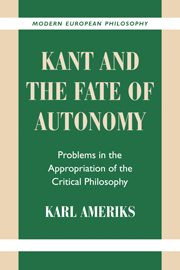Book contents
3 - Kant, Fichte, and Short Arguments to Idealism
Published online by Cambridge University Press: 05 June 2012
Summary
From Fichte on, reactions to Kant have been dominated by the notion, first emphasized by K. L. Reinhold, that there is a “short argument” to idealism. The key idea of what I mean by a “short argument” is, very roughly, that reflection on the mere notion of representation, or on such very general features as the passivity or activity involved in representation, is what is meant to show that knowledge is restricted from any determination of things in themselves. Such a general starting point allows one not only to depart from lengthy and controversial aspects of the Critique; it also means that the resultant restriction to phenomenal knowledge is to cover just about any kind of finite knowers, and not simply those who happen to have our specific forms of intuition.
Although there has been considerable recent use of the short argument, my aim here will be just to show how the early attachment of the short argument to Kant's philosophy, combined with the underlying motives for that attachment, was of the greatest significance for the remarkable nature of the initial reception of Kant's idealism, namely its almost immediate supercession by Fichte and then the wave of absolute idealism. More specifically, after a brief account (in sec. A) of aspects of Kant's writing that bear on both the temptingness and the ultimate illegitimacy of the Reinholdian short argument interpretation, I will explain (in sees. B and C) how this line of interpretation heavily influenced Fichte and thus determined the peculiar picture of Critical philosophy that came to dominate German idealism.
- Type
- Chapter
- Information
- Kant and the Fate of AutonomyProblems in the Appropriation of the Critical Philosophy, pp. 163 - 186Publisher: Cambridge University PressPrint publication year: 2000
- 1
- Cited by

